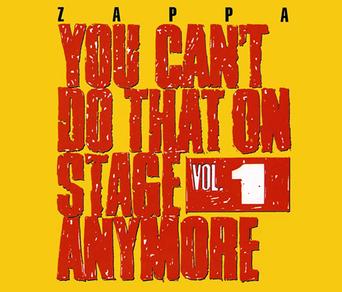It wasn’t until 1988, and his association with the very game Rykodisc label, that he was able to begin to realize the concept. The notes inside the first volume (of six) of You Can’t Do That On Stage Anymore stated the purpose: previously unreleased material, predominantly live, spanning two decades with no regard to chronology. Certain “legendary” concerts were sampled liberally, and sometimes he’d even edit a performance from one period onto one or more of the same song from another or more. Each two-CD set was annotated with comprehensive notes regarding the players, the date, the location, the equipment used, and any asides pertinent to enlighten the listener of any necessary context. (As the series went on, the asides became fewer and far between. Also, various websites and sources have since corrected any factual errors for him.)
Because he was loath to discredit anything he did, we have to take Frank’s word that the music he chose for this series is worth hearing. He liked the idea of having all his bands on the same virtual stage, so that means Flo & Eddie are heard alongside Napoleon Murphy Brock and Ike Willis, Steve Vai is contrasted with Ruth Underwood, and so forth. For the most part, the transitions are seamless, and not as anachronistic as it could otherwise be.
The first volume sets the tone, bookended by two different versions of “Sofa”, several years apart. Conceptual continuity is further explored in several ways, from the in-jokes that weave through different songs to the two renditions of “Louie Louie”—one with improvised lyrics about Ruth, the other a more literal arrangement of “Plastic People”. “The Mammy Anthem” is heard before lyrics were applied to it; “Babette”, something of a counterpart to “Sharleena”, is a rarity from the mid-‘70s, and the original Mothers are nicely represented by the “Orange County Lumber Truck” suite, albeit split into two parts on different discs, and a cover of Bing Crosby’s “Sweet Leilani”.
These sets are designed for completists, not newbies, so they’re best appreciated after sizable exposure to the catalog. Yet, they are enlightening and worthy of revisits as more of the larger picture is filled in. Future volumes would attempt different theses than the all-encompassing thrust of the first, and will be discussed accordingly.
Frank Zappa You Can’t Do That On Stage Anymore, Vol. 1 (1988)—3

No comments:
Post a Comment